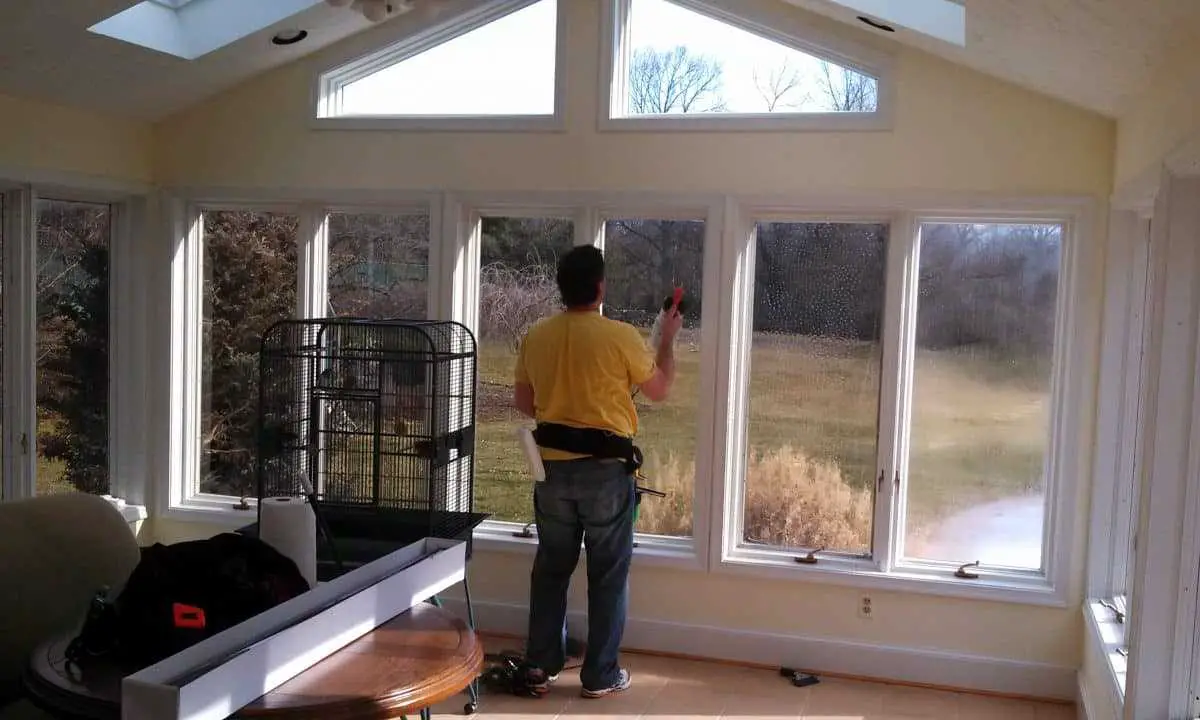Last Updated on February 17, 2024 by Vadym

Tinting home windows has become a popular choice for homeowners who want to reduce their energy consumption and save on utility bills. Window tinting involves applying a thin film to the glass surface of windows, which helps to block out a certain amount of ultraviolet (UV) rays and regulate the amount of heat that enters or escapes through the glass.
The main question on many homeowners’ minds is whether tinting home windows actually saves energy. The answer is yes, tinting home windows can indeed save energy. By reducing the amount of heat that enters your home during the summer, tinting helps to keep your interiors cooler, which in turn reduces the need for air conditioning. Similarly, during the winter, window tinting helps to prevent heat loss, which means you won’t have to rely on heating systems as much.
But how exactly does tinting save energy? When you tint your home windows, the film acts as a barrier, filtering out a significant amount of UV rays that can heat up your interiors. This not only helps to maintain a comfortable indoor temperature but also prevents damage to furniture, flooring, and other interior elements caused by UV radiation.
Additionally, window tinting improves insulation by reducing the amount of heat that can escape or enter through the glass. This means that your HVAC systems won’t have to work as hard to maintain a steady temperature, resulting in lower energy consumption and cost savings.
In conclusion, tinting home windows is an effective way to save energy and reduce utility bills. The combination of UV protection, heat regulation, and improved insulation provided by window tinting makes it a worthwhile investment for homeowners looking to make their homes more energy-efficient.
Tinting Home Windows: An Energy-Saving Solution?

One potential solution to improving the energy efficiency of your home is through the use of window tinting. By adding a thin film to your windows, you can reduce the amount of heat that enters or escapes from your home, resulting in potential energy savings.
When sunlight enters your home through untreated windows, it can increase the temperature inside, causing your cooling system to work harder. Window tinting can help block a significant amount of this solar heat, reducing the need for excessive air conditioning and potentially lowering your energy bills.
Similarly, during the colder months, window tinting can play a role in reducing heat loss. It acts as an additional layer of insulation, helping to keep the warmth generated by your heating system inside your home. This can lead to a more comfortable living environment and potentially lower heating costs.
In addition to reducing heat transfer, window tinting can also provide other energy-saving benefits. It can help to minimize glare, making it easier to enjoy natural light without straining your eyes. By blocking harmful UV rays, it can also protect your furniture, flooring, and artwork from fading, potentially extending their lifespan.
It’s important to note that the effectiveness of window tinting in saving energy will depend on factors such as the type and quality of the film used, as well as the orientation and location of your windows. Consulting with a professional window tinting company can help you determine the best solution for your specific needs.
Overall, tinting your home windows can be a cost-effective way to improve energy efficiency. By reducing heat transfer, minimizing glare, and blocking harmful UV rays, you can create a more comfortable and sustainable living environment while potentially saving on energy costs.
The Importance of Energy Efficiency
Energy efficiency is a critical aspect of home ownership and environmental sustainability. With the increasing demand for electricity and fossil fuels, it is vital to focus on reducing energy consumption wherever possible. The benefits of energy efficiency are multifaceted and extend beyond simply saving money on utility bills.
First and foremost, energy efficiency helps conserve valuable resources. By reducing energy use, we can decrease our dependence on finite resources like coal, oil, and natural gas. This not only preserves these resources for future generations but also reduces the negative environmental impact associated with their extraction, transportation, and burning.
Secondly, energy efficiency plays a significant role in mitigating climate change. The burning of fossil fuels for energy is a significant contributor to greenhouse gas emissions, which trap heat in the atmosphere and lead to global warming. By reducing energy consumption, we can lower greenhouse gas emissions and help combat the adverse effects of climate change.
Moreover, energy efficiency has economic benefits. By using energy more efficiently, homeowners can save significant amounts of money on their utility bills. With energy costs constantly on the rise, implementing energy-efficient measures such as window tinting can lead to long-term financial savings. Additionally, energy-efficient homes have higher market value and are more attractive to potential buyers.
Energy efficiency also contributes to improve indoor comfort and health. A well-insulated home with energy-efficient windows can maintain a more consistent indoor temperature, providing a comfortable living environment throughout the year. This not only enhances the overall comfort of the occupants but also reduces the need for heating and cooling systems, which can improve indoor air quality by minimizing the circulation of pollutants.
In conclusion, energy efficiency is an essential aspect of sustainable living. By implementing measures like window tinting and other energy-saving techniques, we can conserve valuable resources, reduce greenhouse gas emissions, save money, and create a more comfortable and healthy living environment. Investing in energy efficiency is not only beneficial for individual homeowners but also crucial for the well-being of our planet.
How Does Tinting Home Windows Work?
Tinting home windows is a process that involves applying a thin layer of tinted film to the glass surface of a window. This film is typically made from polyester and contains special additives that help to control the amount of heat and light that enters through the window.
The process of tinting home windows involves a few steps. First, the glass surface is thoroughly cleaned to ensure proper adhesion of the tint film. Then, the film is carefully cut to fit the size and shape of the window. The film is then applied to the inside of the window using a solution that helps it adhere to the glass.
Once the tint film is applied, it is carefully smoothed out to remove any air bubbles or wrinkles. This ensures that the film adheres properly to the glass surface. The edges of the film are also trimmed to ensure a clean and seamless appearance.
When the tint film is applied to the home windows, it creates a barrier that helps to reduce the amount of heat and light that enters through the glass. The film reflects and absorbs a significant portion of the sun’s rays, preventing them from passing through the window and into the home.
In addition to blocking heat and light, tinted windows also offer privacy and reduce glare. The tint film can make it difficult for people outside to see inside the home, providing added privacy for homeowners. The film also reduces glare, making it easier to see screens, read books, and work on computers without being bothered by excessive sunlight.
Tinting home windows can provide benefits such as energy savings by reducing the need for air conditioning and cooling costs. It can also protect furniture, flooring, and other belongings from fading and damage caused by UV rays. Additionally, it can enhance the overall appearance of a home, giving it a sleek and modern look.
In conclusion, tinting home windows involves the application of a tinted film to the glass surface of the window. This film helps to reduce heat, light, glare, and offers privacy. It also provides energy savings and protection from UV rays. Tinting home windows is a cost-effective and efficient way to improve the comfort, privacy, and energy efficiency of a home.
Benefits of Tinting Home Windows
There are several benefits to tinting home windows that make it a popular choice among homeowners. Here are some of the main advantages:
1. Reduction in Energy Costs: Tinting home windows can help save energy and reduce air conditioning costs. The tinting film blocks heat from the sun, preventing it from entering the house and reducing the need for excessive cooling. This can lead to significant energy savings over time.
2. Protection from UV Rays: Tinted windows can block up to 99% of harmful UV rays from the sun. This not only protects you and your family from skin damage but also prevents fading of furniture, flooring, and other interior items caused by prolonged exposure to the sun.
3. Increased Privacy: Tinted windows provide an added layer of privacy by making it difficult for outsiders to see inside your home. This can be especially beneficial for houses located in busy neighborhoods or close to street level.
4. Glare Reduction: Tinted windows help reduce glare caused by sunlight, particularly on computer screens, televisions, and other electronic devices. This can make it easier to work or relax without straining your eyes.
5. Enhanced Safety: In the event of an accident or break-in, tinted windows can prevent glass from shattering into sharp pieces. The window film holds the glass together, making it more difficult for intruders to gain access and reducing the risk of injury from flying glass shards.
6. Aesthetically Appealing: Tinted windows can enhance the overall look of your home by adding a stylish and modern touch. They are available in various shades and colors, allowing you to choose a tint that complements your home’s exterior.
Overall, tinting home windows offers numerous benefits, including energy savings, protection from UV rays, increased privacy, glare reduction, enhanced safety, and improved aesthetics. Consider tinting your windows to enjoy these advantages and make your home more comfortable and efficient.
Considerations Before Tinting
Before tinting your home windows, there are a few important factors to consider:
- Local regulations: Check with your local authorities to find out if there are any regulations or restrictions regarding window tinting in your area. Some jurisdictions may have specific rules about the darkness or reflectiveness of window films.
- Aesthetic preferences: Consider the overall look and feel you want to achieve for your home. Window tinting can alter the appearance of your windows, so it’s essential to choose a tint shade that complements your home’s exterior and interior design.
- Privacy: Determine the level of privacy you desire. Window films can provide varying levels of privacy by reducing the visibility from the outside. If privacy is a top concern, consider selecting a window tint that offers a higher level of opacity.
- Heat reduction: If you live in a hot climate or have windows that receive direct sunlight, consider a window tint that offers high solar heat rejection properties. These films can help to reduce the amount of heat that enters your home, which can lead to significant energy savings on cooling costs.
- Glare reduction: If you’re bothered by excessive glare on your screens or furniture caused by the sun’s rays, opt for a window tint that specifically targets glare reduction. These films can help to minimize glare while still allowing natural light to enter your home.
- UV protection: Look for window films that provide excellent UV protection. UV rays can cause furniture, flooring, and artwork to fade over time. Tinted window films can block a significant percentage of UV rays, helping to preserve your belongings and prolong their lifespan.
- Professional installation: While some homeowners may try to install window tinting themselves, it’s generally recommended to hire a professional. Professional installation ensures that the film is applied correctly, without any creases or bubbles, maximizing its effectiveness and longevity.
By considering these factors, you can make an informed decision about whether tinting your home windows is the right choice for your energy-saving goals and overall comfort.
